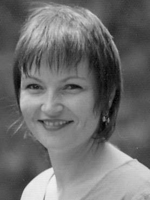Anke Stahl is Head of the Section “Development-related Postgraduate Courses” of the German Academic Exchange Service (DAAD).
What got the Millennium Express rolling?
 It’s really result of the desire on the part of our postgraduate scholarship holders to build and strengthen their network. Wanting to make the most of their time in Germany, they are looking for an interdisciplinary setting in which to meet and get organised. They are looking for ‘outside-the-box’ exchange that not only pushes their horizons but builds the foundation for future networks. For example: A Ugandan from Dresden meets a Ugandan from Hanover as part of the Millennium Express, where the seeds of future projects are sown. Once back in Uganda, they’ll join forces and develop a full-blown project. The students have plenty planned.
It’s really result of the desire on the part of our postgraduate scholarship holders to build and strengthen their network. Wanting to make the most of their time in Germany, they are looking for an interdisciplinary setting in which to meet and get organised. They are looking for ‘outside-the-box’ exchange that not only pushes their horizons but builds the foundation for future networks. For example: A Ugandan from Dresden meets a Ugandan from Hanover as part of the Millennium Express, where the seeds of future projects are sown. Once back in Uganda, they’ll join forces and develop a full-blown project. The students have plenty planned.
Like what?
Some 270 scholarship holders arrive each year in Germany and are enrolled in postgraduate programs all around the country – from Freiburg to Flensburg, and from Bonn to Berlin. With a full schedule, complete with excursions and exams, it’s not always easy for the students to stay involved in the network. But when they met last year in Bonn, they decided to re-commit to a network devoted to issues related to sustainable development, with the baton being passed each year to the new incoming class of scholarship holders. The students have organised themselves into six workgroups, where they look at some of toughest challenges of the 21st century, such as poverty reduction, conflict prevention or resource management. The Millennium Express provides a meeting point, both thematically and organisationally, for more than 40 different academic programmes.
What makes the Millennium Express so special?
Participants come from a diversity of professional and cultural backgrounds, so the workshop discussions are characterised by a wide range of perspectives. The interdisciplinary, holistic approach here in Germany is new to many of the programme participants. It is an experience that both challenges and enriches them. These kinds of workshops can also produce new and innovative research ideas and projects, which the participants can then introduce back in their home countries.
DAAD has been supporting the “Postgraduate Courses for Professionals with Relevance to Developing Countries” programme for 25 years now.
Sounds like a real success story …
Absolutely – and interest in the programme continues to grow with every new year. More than 5,000 students from developing and threshold countries have graduated from the programme since its inception 25 years ago. It’s a unique programme that helps young professionals and junior executives, all with at least two years of work experience under their belts, gain higher degrees in one of 40 different Masters and PhD programmes at a German university. A DAAD scholarship provides them the means to do this. Despite their diversity, the courses have one thing in common: they train the participants in interdisciplinary methods and research and teach them how to approach some of our time’s most pressing issues in a solution-oriented way.
What happens to the participants once they’ve completed their studies?
More than three-quarters of our programme graduates return to their home countries and launch their careers there. This demonstrates that the postgraduate courses are indeed tailored to the needs of the respective countries. Many alumni maintain contact to their German university, to DAAD and to their fellow colleagues from Latin America, Africa and Asia. And some take part in discipline-specific alumni projects, which helps maintain and build their international networks.





